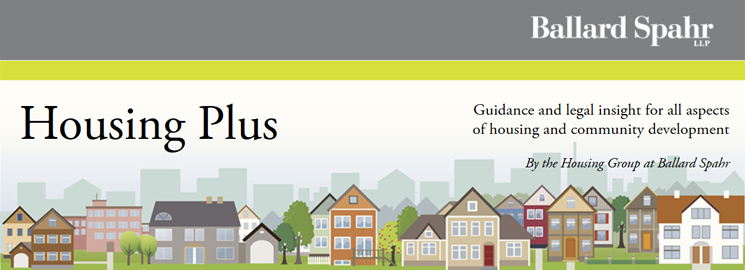
 Since HUD issued its proposed rule for the demolition and disposition of public housing in October of this year, Ballard Spahr has thoroughly examined the regulation and has now provided to HUD comments on the potentially troubling effects of the rule on the public housing portfolio. The rule would revise requirements applicable to the demolition and disposition of public housing by public housing authorities. It proposes to codify a number of processes that have been informally implemented by HUD through notices or other directives, but also proposes a host of new regulatory requirements for obtaining and implementing approvals to demolish or dispose of public housing property. Of great concern, it reflects significant changes to HUD’s view of and treatment of funds derived from the sale of public housing land.
Since HUD issued its proposed rule for the demolition and disposition of public housing in October of this year, Ballard Spahr has thoroughly examined the regulation and has now provided to HUD comments on the potentially troubling effects of the rule on the public housing portfolio. The rule would revise requirements applicable to the demolition and disposition of public housing by public housing authorities. It proposes to codify a number of processes that have been informally implemented by HUD through notices or other directives, but also proposes a host of new regulatory requirements for obtaining and implementing approvals to demolish or dispose of public housing property. Of great concern, it reflects significant changes to HUD’s view of and treatment of funds derived from the sale of public housing land.
Yesterday, we provided comments to HUD, highlighting the likely consequences of this regulation. As further explained therein, our overall concerns are two-fold:
-
Excessive administrative burden. The proposed rule would significantly augment federal oversight and regulatory reporting requirements associated with public housing demolition/disposition. We question the suitability of the proposed new regulatory requirements rule in an era of sequestration. Both HUD and public housing authorities are underfunded and understaffed, yet the proposed rule would add an administrative burden of up to 162 hours per application per year, by HUD’s estimate. Further, much of the new information that must be provided under the proposed rule is duplicative of other HUD information submissions or irrelevant to demolition and disposition.
-
Detrimental impact on private investment in public housing redevelopment projects. The proposed rule would regulate the demolition/disposition process in a manner that significantly increases the risk and costs associated with private investment in public housing redevelopment. Increased risk makes investors nervous and will cause an increase in the cost of redevelopment and/or a decrease in available funding, as some investors decide it is infeasible to invest in public projects. In the current fiscal climate, Congress does not appropriate sufficient funds to support public housing redevelopment activities, allowing for a mounting capital improvements backlog. In light of these issues, we urge HUD to consider the rule’s potential to hinder crucial public-private partnerships.
Our full comments on the proposed rule, including a section-by-section analysis of the regulation, are available here.
We hope our thoughts are helpful as HUD finalizes the rule.